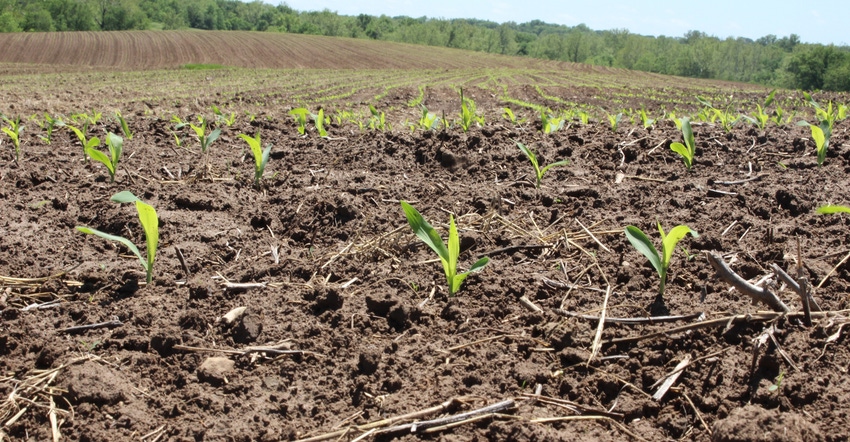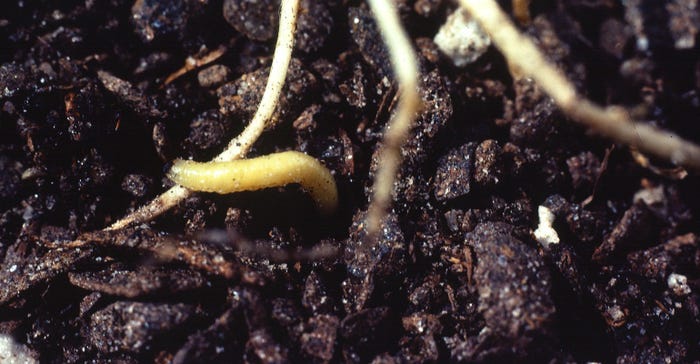
Bayer’s latest protection against corn rootworm is SmartStax Pro, which offers the company’s third-generation corn rootworm trait. After gaining final import approval earlier this year, it is ready for full U.S. launch in 2022, and Bayer expects to launch it in Canada in 2023.
SmartStax Pro already has a broad-spectrum protection against both below- and aboveground pests, as well as tolerance to glyphosate, and glufosinate herbicides.
However, according to Jody Gander, market development manager in the corn agronomic systems at Bayer Crop Science, this improved product line offers the company’s RNAi-based mode of action. Added to the existing Bt proteins, it targets corn rootworms.
Corn rootworm problem
The USDA and agronomists have long referred to corn rootworm as “the billion-dollar bug.” The adult eats at the corn silks, while the larvae dine on the roots, which opens the plant up to increased risk for disease and stress.
 GUT REACTION: RNAi technology in SmartStax Pro uses a gene-silencing trait to cause death in corn rootworm larvae.
GUT REACTION: RNAi technology in SmartStax Pro uses a gene-silencing trait to cause death in corn rootworm larvae.

University and industry research show that given the right conditions, this pest causes up to 45% yield loss in corn. This level of damage has farmers seeking options for control.
Corn rootworm is a challenging pest for North America corn growers because the level of damage varies from year to year. Weather, soil properties, crop rotation and management practices can influence the presence of this pest. Currently, the main disrupter to the pest’s life cycle in the soil is crop rotation. Farmers switching from corn to soybeans find a reduction in the levels of corn rootworm in the soil.
Still, there are areas where corn on corn is the lifeblood for farmers. These farmers must reach to alternative management control options, like hybrid selection with biotech traits. Bayer’s latest advance provides growers a different mode of action to reduce corn root damage from this pest.
Action breakdown
“SmartStax Pro will be the first product on the market that has three modes of action for corn rootworm control,” Gander says. Two modes come from what researchers call “traditional” Bt protein technology (Cry34Ab1/Cry35Ab1 and Cry3Bb1), but the third mode is from new RNAi technology.
Here’s how these modes differ:
Bt technology. Bt proteins are bred into the plant and produced in its tissue, Gander explains. The corn rootworm larvae feed on the root tissue and ingest proteins. Once inside the insect, the proteins undergo a process where the toxins become activated. That toxin moves to the insect’s cell wall or the cell membrane of its midgut. Once those proteins bind to the midgut, they result in pores that cause a loss of the membrane integrity. And that, Gander says, leads to eventual death of the insect.
RNAi technology. RNA interference, or RNAi, is a method of blocking genes by inserting short sequences of RNA, or ribonucleic, acid. “In the plant,” Gander explains, “instead of a protein being produced, the plant produces double-stranded RNA. The corn rootworm come along and they feed, ingest that double-stranded RNA; and once ingested, fragments of that double-stranded RNA will target a specific section of this messenger RNA, and that causes this messenger RNA to be broken up, and it doesn’t function properly, and therefore that protein is not produced.” And the protein is essential for the corn rootworm to survive. No protein, no corn rootworm.
Protecting corn roots
Bayer has been testing SmartStax Pro for several years on farms with high numbers of corn rootworm. What the company found, Gander says, was better rootworm protection in fields with moderate to heavy corn rootworm pressure.
Many trials with significant corn rootworm pressure saw very little root pruning or feeding scars with SmartStax Pro. He adds that Bayer’s latest endeavor provides the “proven performance of Bt technology by adding in this other mode of action that not only gives us greater efficacy, but also gives us better trait durability.”
This summer, Bayer will expand its commercial testing programs and on-farm trials with SmartStax Pro. Bayer plans to offer SmartStax Pro across key relative maturities in 2022, and in all maturities by 2023.
About the Author(s)
You May Also Like






